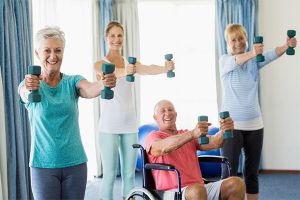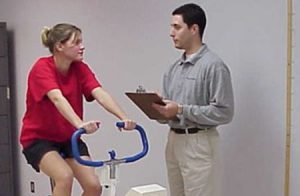Our Accredited Exercise Physiologist can deliver personal training or group training sessions for people looking to improve their health and fitness or their performance in sport or life.
“The muscle-wasting condition ‘sarcopenia’ is now a recognised disease. As we grow older, the size and strength of our muscles progressively deteriorates. This can affect our capacity to perform everyday activities like standing up from a chair, climbing stairs or carrying groceries. For some people, muscle wasting becomes more severe, leading to falls, frailty, immobility and a loss of autonomy”. Read more here
Our exercise programs can target:
- Weight loss
- Muscle tone
- Muscular strength, power, endurance and mass.
- Cardiovascular fitness
- Balance and stability for falls prevention or sport
- Flexibility
- Speed and agility
- Athletic performance
- Injury rehabilitation
- Neurological conditions [e.g. Parkinson’s disease]
- Anxiety and depression
- Cancer recovery
- Cardiac rehab
- Arthritis management
- Diabetes management
Speak to our Accredited Exercise Physiologist to find out how strength or resistance training could help your life

Strength training to build lean muscle.
Building lean muscle is a key aim of strength or resistance training. However, stronger muscle doesn’t necessarily get bigger or bulkier. The effect of strength training is to improve efficiency of movement and the efficiency of our neural connections. Stronger lean muscle allows joints in the body to have more support, more lifting and carrying capacity and better endurance. As a result, movement become easier as our muscles can better support us and our joints. This decreases joint degeneration, pain with movement and the time it takes to get moving!
Lean muscle mass – the key to your metabolism
The amount of energy your body consumes at rest (i.e. your metabolic rate) is heavily influenced by the amount of lean muscle tissue in your body. As a result, if you increase the amount and quality of muscle mass you have in your body (even slightly), you can cause a pretty substantial increase in your body’s metabolism. So, a poorly understood, but key benefit of strength or resistance training is an increase in our metabolic rate or how much energy we burn. Muscle is great at burning fuel, even during rest! In short, more lean muscle means you will burn more energy every single day, irrespective of any exercise that you may be doing.
Read More...
That’s why the more muscle we have, the easier it is to lose weight. The bigger the engine, the more capacity to burn fuel. By increasing lean muscle, you help your body to store glucose and regulate blood sugar levels.
“….the more muscle we have, the easier it is to lose weight.”
Resistance training allows us to take advantage of all aspects of fitness – strength, cardiovascular, balance, neurological, power, functional fitness, and it makes you feel good. It is suggested that strength training be performed 2-3 times per week to take advantage of these benefits.
Read Less


Resistance training for diabetes
Resistance training (also known as strength or weight training) has many health benefits, including increasing your ability to perform daily functional activities and increasing your metabolism … and no, you don’t have to become ‘big and bulky’ to reap the rewards. In fact, very few people will be able to achieve the ‘body-builder’ look even if they try.
Because muscle tissue requires a lot of energy, which is taken from the food we eat, by increasing the amount of lean muscle mass in our body, we help increase our metabolism and lose weight (even when we are not exercising). The higher the muscle mass you have, the more efficiently your body works and the easier it is to manage your weight or keep the weight off long term!
Read More...
During strength training the muscles burn sugar (glucose) through a process that doesn’t require insulin, resulting in reduced blood glucose levels. This means for people with type 2 diabetes, where the body can no longer produce or use insulin properly, regular strength training can help to manage blood sugar levels with less need for medication. In fact, resistance training has a 4-way impact on diabetes management – it helps
(1) Reduce visceral fat surrounding the organs.
(2) Weight loss.
(3) Reduce blood glucose levels, and
(4) Increase the body’s sensitivity to insulin.
Read Less
Strength training for depression.
Strength Training has been shown to have many fantastic benefits for men and women. But what about Strength Training for depression?
A recent meta-analysis published in the journal: JAMA Psychiatry confirms Strength Training as an alternative and/or adjunct therapy for depression. The meta-analysis included: 33 clinical trials, with 1,877 participants. Gordon and colleagues found: “resistance exercise training was associated with a significant reduction in depressive symptoms.”
Speak to our Accredited Exercise Physiologist to find out how strength training could help you!
Reference:
Gordon BR, McDowell CP, Hallgren M, Meyer JD, Lyons M, Herring MP. 2018. JAMA Psychiatry. 2018;75(6):566-576. doi:10.1001/jamapsychiatry.2018.0572


What to expect when you see an Accredited Exercise Physiologist to improve your health and fitness:
- A thorough assessment and movement screening to determine any muscular or postural imbalances or restrictions and predict injury risk.
- Extensive goal-setting to ensure that all exercises are targeted towards reaching a particular goal that is important to you.
- Tips and tricks to improve your motivation and ensure that your exercise program becomes a regular part of your daily life and not a “chore” that becomes boring and unenjoyable.
- Consistent support to help you through the tough times and guidance to keep you on the path to success.
- Exercise prescription stemming from the knowledge and experience of a 4-year University degree and clinical experience.
- The safety and peace of mind knowing you are being assisted by an allied health professional.
Personal or group training sessions are held at our Toorak Gardens and Oakden clinics utilising a range of different equipment including Pilates apparatus, resistance bands and free weights to give you a varied program. Outdoor sessions are also available if the weather permits. Your progress will be constantly reviewed with thorough and validated outcome measures to ensure that you are consistently seeing positive results.
If this sounds like something you are interested in and would like to find out more, give us a call today on (08) 8331 1557 and begin your exercise journey!
Depending on your health fund and policy, there is a possibility that you may be able to claim a Private Health rebate for sessions with an Accredited Exercise Physiologist. For further information and item numbers, call us today on 8331 1557.

